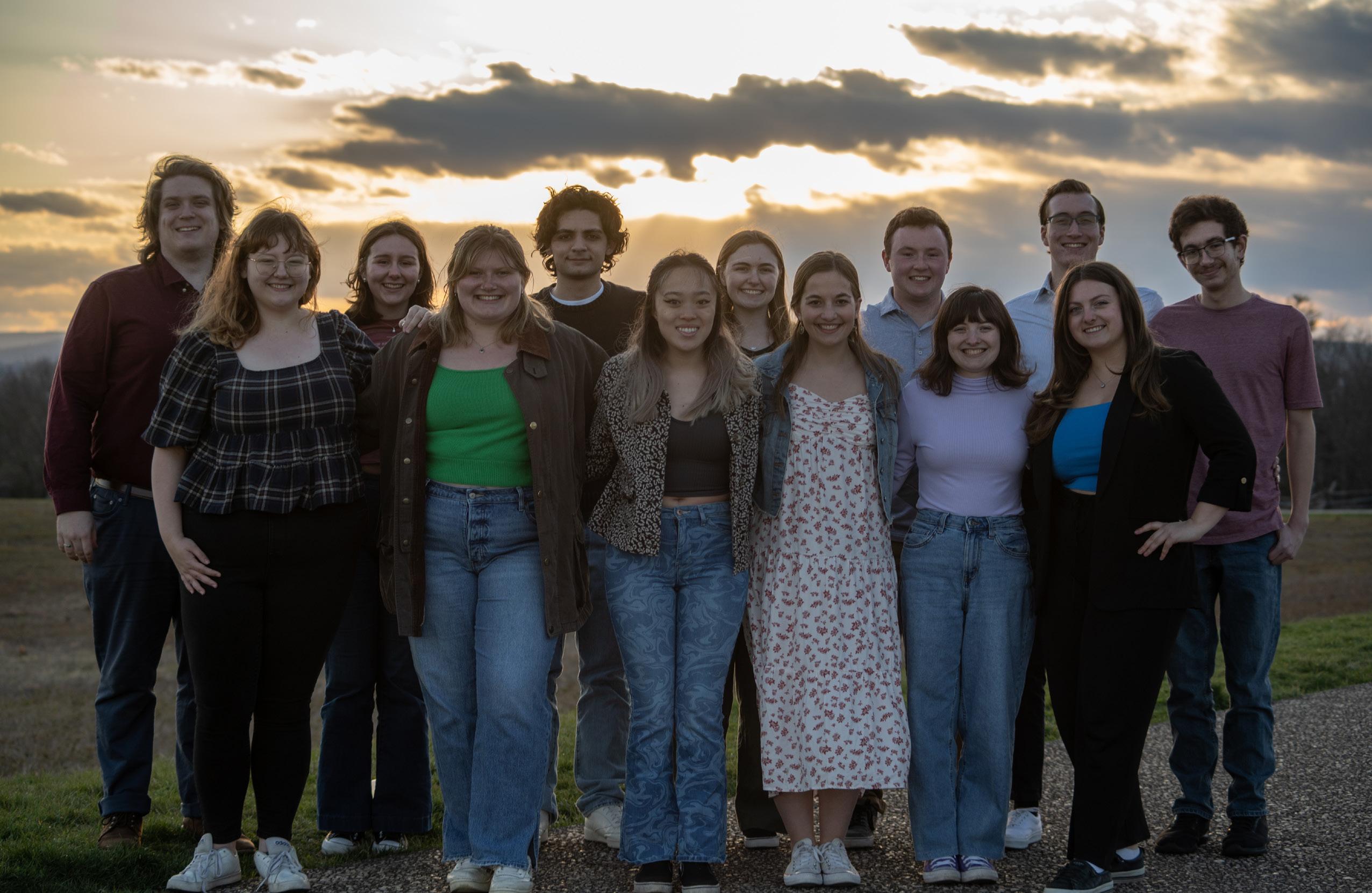The Gettysburgian
From Ukraine to Gettysburg
Learn how Sophiia and Marko made their way to Gettysburg College


Learn how Sophiia and Marko made their way to Gettysburg College


The Gettysburgian has been an integral part of my college career, so this final editor’s note is bittersweet for me. I am so grateful for my time here, for the friends I have made and the stories I have had the privilege to tell, and I am sad to see it end. But I am also grateful for the experience The Gettysburgian has given me that will help me pursue a career in journalism at a national level.
I have been a part of The Gettysburgian since orientation week my first-year, and was delighted with an opportunity to do my favorite thing: writing. I just didn't realize then, sitting around a table in Glatfelter Lodge with people I would grow to become great friends and coworkers with, that joining this organization would be the best decision I made at Gettysburg. I hope that I have made The Gettysburgian as welcoming of a place as it was for me when I first joined.
The beauty of college journalism is the way we can tell the stories we hear students talking about on a daily basis. We have the unique opportunity of being close to our sources because we are them. We know what students are interested in, we hear faculty talk about issues in our classes, and we too feel the impact of the issues we write about. Our task is to deliver these issues as unbiased as possible, but also to serve the people we know and love on campus.
This magazine feels like an amalgamation of many of the issues we have been talking about around our table every week. We have spent so much time gauging how students feel and what they want to know. It is our hope that this issue gets to the heart of student concerns as we dive into the student and campus relationship with the Gettysburg Police Department, the way traditions have changed since the pandemic began and how students with dietary restrictions are impacted by the food choices in our dining centers. We hope to unveil the Board of Trustees for a student body who may not understand their role. We give our opinion on the distance between administration and students, and the lack of say we have in the future of our institution.
We also highlight the experiences of Ukranian international students on campus, English Professor Rachele Salvini — an immigrant from Italy with a PhD from Oklahoma — and ask seniors to share what their time at Gettysburg has meant to them. We hope to highlight the multitude of experiences this community is host to.

I’m going to miss those weekly conversations in Plank 103, telling your story, but I know that the editorial board after me is up for the challenge of documentary tomorrow’s history. What an honor it has been serving you.
Katie Oglesby ’23 Editor-in-Chief The GettysburgianSenior
Compiled by Mikelyn Britt, Opinions Editor
By Katie Oglesby, Editor-in-Chief By Ella Prieto, Assistant News Editor18 20
By Kyle Hammerness, Features Editor By Victoria Staub, Arts and Entertainment EditorGettysburg Campus Safety Officer Ricky Pearce Retires
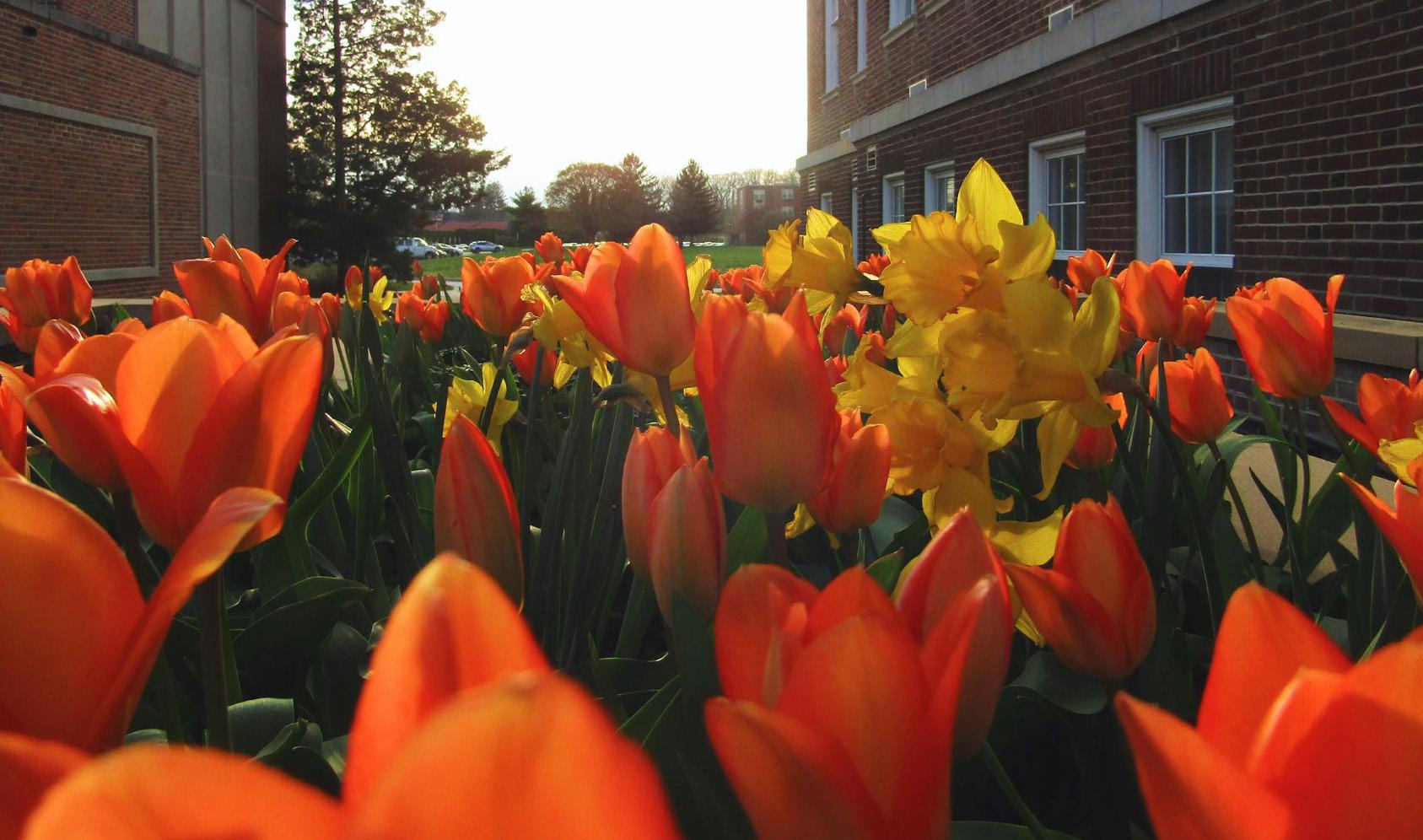 By Alicia Method, Staff Writer
By Alicia Method, Staff Writer
Editorial: Behind the Scenes in Administration
Highlights a Need for Student Voices
By The Gettysburgian Editorial BoardAs Gettysburg college students begin looking at their housing options, they are most likely finding a lack of amenities that are either not there or inaccessible or far away. There are far too many residential areas on campus that are not equipped with their own appliances. Like many students, I have experienced the frustration of needing to go across the street or down a few flights of stairs to clean my clothes and do my laundry. Moreover, there is a lack of kitchen/cooking areas for students to learn and experience how to prepare their own food. Both my first-year residence hall and my sophomore theme housing lacked a kitchen, and I regretted not being able to make my own healthy meals instead of microwave ramen. Learning to cook meals and cultivating important planning skills that come with having access to a kitchen are limited to students who obtain housing with those specific appliances, which sometimes only comes after sophomore year. Moreover, in real life, most people would not find such a lack of washers/dryers, kitchens, or even drinking water in their own homes. Most students on campus use a Britta, faucet filter, or buy unfunded plastic packaged water. It could be good for Gettysburg to implement more appliances in residence halls and housing, especially at the rate that the college charges students for room and board.
— Emma Blackman ’25Post coronavirus Gettysburg College looks almost like it did in fall 2019, but there is something
missing from campus that everyone has seemingly forgotten about – Zipcars, and its time Gettysburg brings them back. Zipcar was a carshare service that had two cars on Gettysburg’s campus. Students could join the service for a $15 a nnual student fee, and through the app, schedule a time to rent one of the vehicles for approximately $10/hr. T he Zipcar company also provided an in-car debit card to refill the vehicle’s gas. For students without access to their own cars, this was the best way for them to run errands. Gone were the days of the obnoxious half hour Rabbit Transit bus rides to Walmart, awkward bus transfers to return to campus, or asking friends for rides. Students simply placed a reservation and drove on their own time. Not only was this a significant time saver, but it also opened up parking spots as firstyears relied more heavily on this system than pining for a parking pass. If Gettysburg College really wants to make transportation easier and show they care about their lower income students, they will reinstate Zipcars.
— Brandon Caban ’23
The College always seems to be finding new ways to entertain students and provide some short solace from the droll of everyday life. Bingo, plant potting, and other assorted activies all require OSAGL to tap into its already too small budget. With the weather changing and students emerging from their winter dormbernation, OSAGL should take a new stance. Just as they did during GettysburgGives, utilize the cotton candy machine, snow
cone machine, and sound system and set up cornhole and frisbee on Stine Lake. It is an automatic atmosphere and mood booster, is easy to staff, allows students to come and go as they please, and the only cost to OSAGL is sugar and ice. Dear Jon Allen, keep it simple and keep it sweet. Once a week, turn Stine Lake into a mini carnival and turn up the music. The students will thank you (and so will your wallet).
— Dominic DiLuzio ’26This campus undergoes a magical transformation once a year, when the temperatures suddenly rise to a sweet 65 degrees and students reemerge from their dormitory cocoons. Frisbees on Stine Lake, Adirondacks in front of Penn Hall, and a swarm of students on the CUB patio all welcome Spring to campus. But the best part, without question, is the number of dogs who come to visit. From Dr. Isherwood’s famous Bertie, or that strange wiener dog/lab hybrid, the return of the dogs is an event which every Gettysburgian looks forward to. Their presence is good for everyone – students get to de-stress from their research papers and lab reports, faculty get to flaunt their prized pooch, and of course, the dog gets more belly rubs than it could dream of. Certainly, we must be responsive to students with allergies or fears, but on the whole, Gettysburg College should increase the number of dogs on campus and add additional Dog Days through counseling services. For our sake, for the dog’s sake, and for goodness’ sake, let them dogs out.
— Brandon Neely ’23Rachele Salvini, the Emerging Writer lecturer in the English department, grew up in Italy. She completed her undergraduate studies in Florence with an influential study abroad experience in Norway. Salvini visited the United States for the first time to participate in a writing workshop in New York and knew she wanted to work with English by writing and teaching for the rest of her life.
After her return to Italy to finish her undergraduate studies, Salvini completed her master’s in creative writing at the University of Westminster in London.
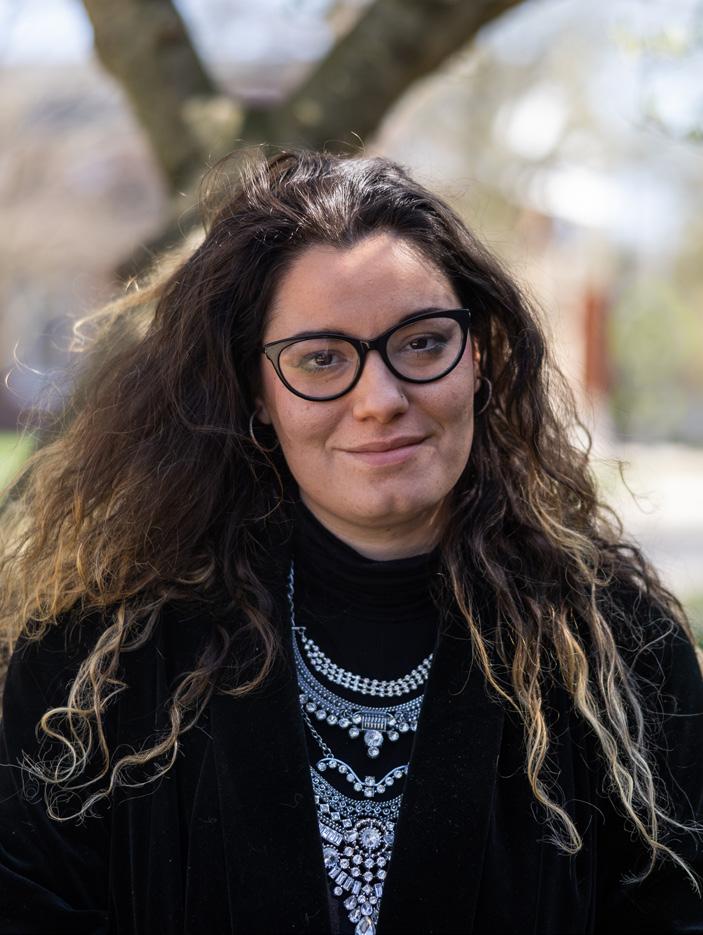
She decided to further pursue her love of English by attending Oklahoma State University for five years to pursue her doctorate in creative writing. When Salvini started her PhD program, she began as a teaching assistant, which helped her discover her love for instructing even more. The opportunities to study English are vastly more accessible in the United States, allowing Salvini to follow her passions to ultimately become a professor. After her graduation in May 2022, Salvini accepted a teaching position at Gettysburg. Given that Salvini previously was at a large public university with about 23,000 students and now teaches at a small private college, she experienced a large transition with regard to both the students and the living environment. Despite this, she reiterated that she loves teaching, regardless of what institution she is at.
At Gettysburg, Salvini’s favorite thing to teach is creative writing. She also includes an exploration of composition, technical writing, and
professional writing in her courses. Salvini explained, “I like to use different mediums, like a multimodal approach, which could include how to make a podcast for instance.”
This approach makes Salvini’s teaching unique within the department due to her encouragement for students to learn in different manners by utilizing various forms of media. She also stands out due to her emphasis on textbook affordability. She acknowledged the importance of lowering the cost of classes for students by providing course materials on Moodle.
Salvini noted, “Coming from Italy where universities are not as expensive and then spending five years at a big public university, I thought that many students are paying a lot of money to be here.”
She continued to explain that many students take classes in departments they might not be particularly interested in to fulfill
curriculum requirements, which makes textbook affordability even more important.
As a professor, Salvini strives to foster a positive learning experience for her students.
“
I’m very honest with my students because I want them to see me as a human being, not just like an authority figure. They can then also be open and I feel that helps in creating a more intimate class environment,” said Salvini.
She continued, “At the start of the semester in every class I teach, I tell students that it’s important to challenge yourself and be open. People who have different experiences come from different backgrounds, so practicing empathy and kindness towards each other is an important thing.”
Although Salvini has been speaking English for so many years following her move from Europe, she still feels that her English could be better, especially when she is teaching or feels nervous. The positive learning environment she creates leads to her ability to ask students about her pronunciations.
“ Students are very nice, and I can actually ask them if I butchered a word,” she said.
While Salvini experienced a unique path to end up teaching at Gettysburg, her decision to follow her interests while still in Italy resulted in an opportunity to write and teach English for the rest of her life.
“
My love for teaching all classes related to English will never change. I enjoy working with all students regardless of if it’s in rural Oklahoma or here in Gettysburg,” Salvini explained.
Oneof the few student representatives to the Board of Trustees (BOT), Student Senate President Miranda Zamora ’23 noted that, “I do not feel that students understand the BOT. If I am being completely honest, I do not fully understand it myself…”
Similarly, Rachel Herr ’26 said, “I don’t know what the Board of Trustees is. I’m sure they make important decisions, but they have had no impact on me during my first year.”
Zamora continued on to say that she believes students should be more involved in the Board of Trustees, and noted that she herself only appears at one of their committee meetings: the College Life Committee. This is due to her role in Senate. In this role, she said she answers questions the Board of Trustees has from the perspective of a current student.
The Chair of the Board of Trustees David Brennan ’75 said the Board of Trustees is very focused on students, though, across the board, students seem to feel disconnected from it.
Carter Zamora ’23 also attends Board of Trustees meetings through his role as the Chair of the Academic and Career Affairs Committee in Student Senate.
He noted that, “Part of the student not knowing what the Board of Trustees does is probably in communication. Maybe a yearly report on open sessions of the Board meetings would help clarify what the Board does.”
When asked to explain what the Board of Trustees does to students who may be unaware, Brennan
shared that the Board of Trustees’s main role is to “provide oversight and assurance” and that the Board has the authority to approve certain decisions.
He explained that the Board of Trustees provides oversight of (and development of) the strategic plan and the academic programs, amongst others. The Board also approves the annual budget for the College.
This annual budget is “created by each individual area of responsibility under the president… The provost is responsible for the administration of salary and wages for the faculty. The Chief Financial Officer Dan Konstalid looks at the assumptions about wages for staff.”
Brennan elaborated that the Board of Trustees also approves and oversees spending from the endowment fund.
Though, Brennan noted that there are donor restrictions and state guidelines and limits on the spending from endowment funds. He explained that Pennsylvania relaxed the guidelines during the pandemic, which allowed the Board of Trustees to approve “a modest, temporary increase to endowment spending” to help with the impact of the pandemic.
Brennan further explained that the Board of Trustees is broken up into committees, as previously noted by Miranda Zamora, who attends only College Life Committee meetings while her brother Carter Zamora represents students at the Academic Affairs Committee.
Carter Zamora noted that he was able to give feedback on their discussions during these meetings, as well.
Brennan shared that the Academic Affairs Committee reviews the curriculum, but “the charter of the college specifically states that the faculty have the power to prescribe the academic program of the College. The President is the chairman of the faculty, but all the faculty officers are elected by the faculty.”
Moreover, Vice Provost and Dean of Arts and Humanities Jack Ryan shared that he and his colleagues in the Provost’s Office, along with the chair of the Academic Policy and Program Committee, are on the Academic Affairs Committee.
He explained that during these meetings, “Academic Affairs committee hears from the chair of a department that has undergone an external review. The committee—and the full board— are provided documents prior to the meeting: a department’s self-study, the report from external evaluators, and the response from the department under review in response to the report. At the meeting the department chair is asked to respond to three questions: ‘What did you learn and/or what surprised you from the review? What are the opportunities for improvement that lie within the sphere of influence of the department itself, and its members? What are you most proud of?’”
He added, “Many board members know faculty because of social gatherings and/or the amount of years of board service.”
Brennan shared some of the other committees, as well; these include but are not limited to, the Executive Compensation Committee, the Executive
Committee, Finance Committee, Governance and Nominating Committee, Information Technology Committee, and Enrollment and Education Services.
He said that one of the chief concerns has been the decline in net tuition revenue, which he said has caused the Board to spend “nearly every meeting some discussion on finance…We look at the projections going forward as to what net tuition revenue per student needs to be, what the size of the incoming class needs to be, and the campus as a whole.”
He shared, though, that the Board does not set the agenda. Instead, Iuliano and his Chief of Staff initiate them, but are reviewed by Brennan. He noted that he decides what the “deep dive for each meeting” will be.
“I like to pick a topic and spend a fair amount of time on it,” he said. “I like to go an inch wide and a mile deep on a topic or two at each meeting, rather than just kind of skim the top of everything.”
He said the last meeting included a deep dive into the budget. He explained that this was because of
demographic shifts reducing the number of College graduates postCOVID, and the impact it may have on net tuition revenue.
He also shared the demographics of the Board itself.
“The Board is primarily made up of alumni,” he said. “We have a couple of non-Gettysburg members of the Board who have an interest for one reason or another. We have the president of the alumni board and the president of the BOLD council, and they are members of the board for I think two years…so they can carry the message back out to their constituencies as well.”
He also explained that the expectation of trustees is to be philanthropic toward the College. Trustees share four year terms, and the maximum is three terms of four years (so a maximum of twelve years). That said, members can become a Trustee Emeritus which says they may attend meetings, but are a non-voting member.
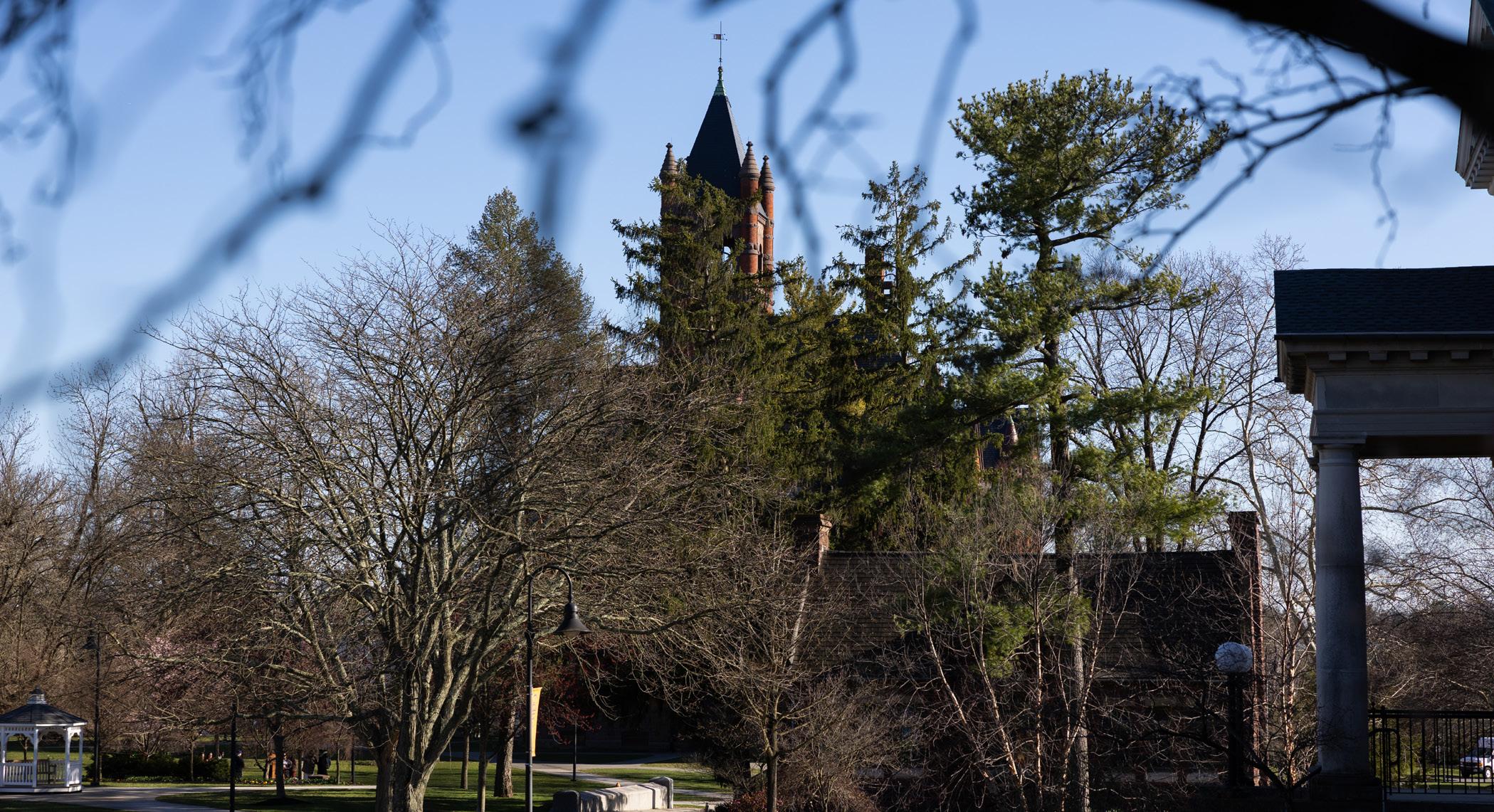
Most of the members are alumni from the ’80s, ’90s, and 2000s. Brennan noted that he and two other members from the ’70s will
be leaving in May when their 12 years are up, which will leave only one Board member from the ’70s left.
Miranda Zamora noted that she wished the Board of Trustees would include students more.
“I wish students had more of a role with the BOT,” she said, “as I feel it is important to connect the trustees with the students. I personally would have been willing to attend more meetings outside of the College Life committee if I would have been provided with the opportunity.”
She continued by saying, “I feel that administration could do a better job of relaying information back to students. They discuss so many things at the board of trustees meetings, yet students are often unaware of what was discussed, including myself. I can update students on the College Life Committee of the BOT since I attend those meetings, but those hardly give a full picture of what was discussed, seeing as this is only one meeting out of the many that occur when the BOT meets.”
Studying abroad for many students is a lifelong dream, but for two students at Gettysburg, it has provided them with a unique experience while giving them the skills to make a difference in the future of their country. Marko
Tsymbaliuk ’26 and Sophiia Davydova ’26 are Ukrainian students who, through a program called Ukrainian Global University, came to study here at Gettysburg so that after college they could return to Ukraine with skills that can help rebuild their country.
Ukrainian Global University was created in the first weeks after the Russian invasion of Ukraine in February 2022. It was created by several governmental organizations and Ukrainian educational institutions. Its goal was simple: to identify talented individuals and support them and their goals so that they can overcome the consequences of the war.
Gettysburg College became involved in this project because of Aidan Wisniewski-Campo ’24. Wisniewski-Campo was searching for ways to get the campus community involved in the issues surrounding the war in Ukraine and thought that a Center for Public Service immersion trip could help the humanitarian aspect of the war. He said, “I was met by a diplomat at the US Embassy in Kyiv, and he misunderstood what I was looking to do because he referred me to an organization that was not meant for
orchestrating trips, but rather for facilitating partnerships between Ukrainian Global University, and undergraduate and graduate schools.”
Wisniewski-Campo, with the help of Professor Rimvydas Baltaduonis brought this to the attention of the administration. Describing the process, Wisniewski-Campo said, “We scored a meeting with Brad Lancaster, director of International Affairs, Gail Sweezy, and a few other administrative officials, and they basically said, we’ll do it.”
The two students admitted to Gettysburg College were Davydova and Tsymbaliuk.
Davydova, who is interested in biology, lives in the Kharkiv region of Ukraine about thirty kilometers from the Russian border. Kharkiv was a hotbed of conflict in the beginning of the war as Russia tried to capture the second largest city in Ukraine.
Davydova described her personal experience living through the beginning of the war saying, “I remember the last day before the war, it was really good day. It was a spring day, and we had a lot of stuff in school, and the morning on 24th of February, I remember I woke up because of the sounds of explosions. I was afraid, I was thinking about my family, my future, what we’re going to do because we had a lot of thoughts that war would start but nobody believed in this, even myself.”
Davydova fled to the center of Ukraine away from the fighting but returned to Kharkiv before her first year of university. Despite the turmoil in her life, Davydova attended college in Ukraine and had to overcome challenges in the midst of the war.
She said, “I went in person to my university, but you see the thing is when we had air alerts, we had to go to the bunkers, so our classes stopped. Sometimes we had online classes when we had a lot of bombings in Ukraine, but of course, you have problems with lights, you have problems with the internet connection and then nobody can have access to online classes.”
Davydova’s high school was bombed during the summer the day after her mom picked up her grades from her school. While the war was going on Davydova looked for opportunities to fulfill her lifelong passion to study abroad. She said, “I have a lot of friends from Ukraine who study abroad, and I remember I was so excited when I talked with them about ways to find education abroad. I’m a person who likes challenges and to smash boundaries, so it was really interesting for me to receive the best education in the world and to have an experience which can help me to become more mature.”
After applying to several Canadian universities without success, she stumbled upon Ukrainian Global
University while online. Davydova said, “During the summer, I saw this program on Facebook or another social network, but I did not apply. Then in the autumn I was like ‘I can try, one more time,’ and I applied to Ukrainian Global University, and it was the best choice of my life.”
Regarding her transition, Davydova commented, “It was really hard emotionally because I missed my family, my home and had a language barrier, but now I have a lot of friends. I have people who can help me, who support me here in Gettysburg, and I’m so excited that everyone’s friendly on campus.”
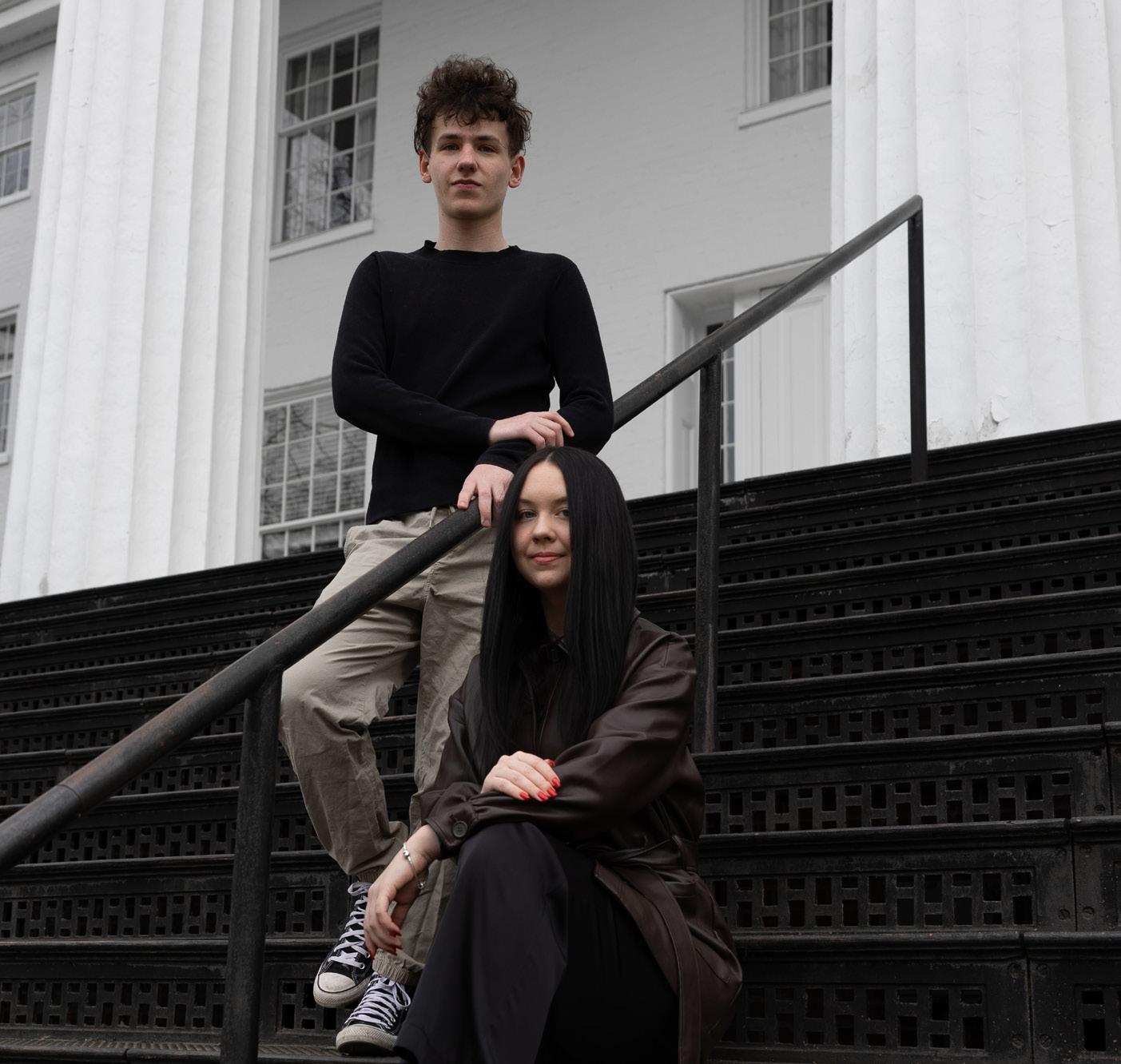
Like Davydova, Marko Tsymbaliuk’s life changed drastically after the war started. He lives in Western Ukraine and wants to be a computer science major because he is interested in digitalization.
Once the war began, his last months of high school had to take
place online. Tsymbaliuk said, “We didn't have school as classes were canceled for an entire month and only later after that we had online education from that point on and that’s how we finished our last year of high school.”
Tsymbaliuk, even before the war, knew that he wanted to receive an education abroad. His path to Ukrainian Global University was quite accidental.
“ I just read a news article about it, and it really piqued my interest because first of all, I'm very patriotic and rebuilding the country as well as a way of getting education abroad and using it to rebuild Ukraine was very interesting to me. I've always wanted to get an education abroad because traveling as you know develops you in a lot of ways. I've always wanted to do that, and the goal of helping your country in these really upsetting circumstances that the country ended up in, it just feels like my moral duty to help it,”
shared Tsymbaliuk. His transition to Gettysburg College has been smooth despite starting a semester after the other first-years. He noted, “I like to think of myself as a person that seeks other people so it wasn't too hard for me to make new friends. It was definitely harder, but I think the mindset of people is different. They are more open to new friends which is different than it is back home.”
Tsymbaliuk left Ukraine before his eighteenth birthday which is important because now that he has turned eighteen years old while he was abroad, he is not allowed to return to Ukraine because he will be conscripted into the military. He said, “I'm really bummed out about that. I don’t know why they won’t make an exception because it’s a huge problem. There's a lot of students who want to go abroad, or people that already paid their tuition to study abroad, and they can't leave the country because there's no exception for anything.”
With both Tsymbaliuk and Davydova adapting and succeeding here at Gettysburg College they mentioned that they hoped that this partnership would continue, and that the College would be admitting more Ukrainian students through the program.
An anonymous source from the College said that the partnership with Ukrainian Global University will continue, but the details are still being negotiated and finalized.
ThisJuly will be the 160th anniversary of the Battle of Gettysburg, but regardless of whether the anniversary year is a rounded-off centennial or ends in a random integer, an anniversary is always an opportunity to discuss the issue of Civil War memory. As members of American society, it is crucial that we use this anniversary to understand the events that took place years ago because they condition the world we live in today.
For the most part, we all know about the fighting and bloodshed that took place at Gettysburg— that’s what makes Gettysburg "cool," right? On the battlefield, we see monuments plastered with death tolls and covered with words like “honor” and “courage.” However, this isn’t the whole picture. The monuments won’t tell you that more soldiers died of disease than direct gunfire, about the feelings of desperation that caused men to desert, or the duties that enslaved people carried out on the battlefield. We need to improve the narrative that is told about Gettysburg so that it encompasses all aspects of the war, not just the ones that make us feel good. It is obvious that this re-evaluation is necessary because as visitors leave Gettysburg, they pass Confederate flags flaunted in store windows. If the tour guide was right about who won, then why are we still producing and selling this flag one hundred and sixty years later?
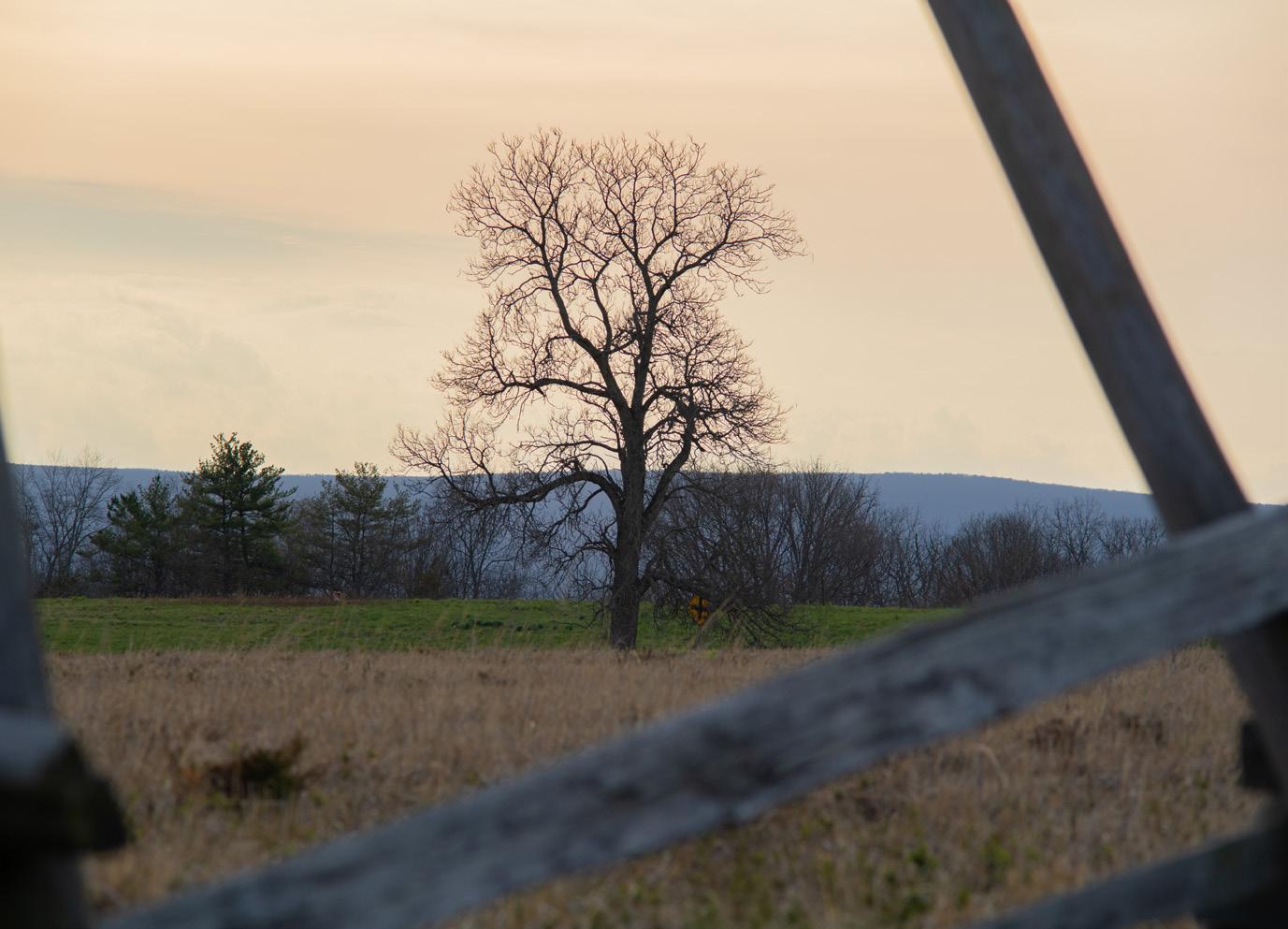
To resolve this issue of misremembering, it is important that we promote the study of Civil War memory. Fantasized versions of history come from those who are unwilling to accept the truth — often because they have only been exposed to one version of history. A society that bases its history on
fabrications and single narratives can not function properly or morally. When fantasy is accepted as history, it devalues the purpose of the fighting that occurred because it prevents the intentions of the war from coming to fruition. The identity of Gettysburg is highly characterized by Lincoln’s address. Lincoln tells us that it is up to us — the living — to carry out the unfinished work of those who died here. When we neglect to properly remember the War, we throw out the work that has been done.
As students at Gettysburg College, we have the opportunity right at our fingertips to use history to better our society. Our institution is uniquely situated in a place where its students are in direct contact with the space that they are studying. The College should use this year’s anniversary as an opportunity to promote the Civil War Era Studies Department. The CWES Department promotes an educated understanding of the War through professors who are experts in their field with access to incredible
artifacts, resources, and field studies. The instruction provided by this department prepares students to solve the issues that our world is facing today — and isn’t that the intent of a “consequential” education?
Regardless of your academic focus, I encourage you to enroll in a CWES course during your four years. Due to the nature of the Gettysburg College curriculum, it is likely that something you learn in a CWES course will be applicable to whichever field you are in. As an Italian major, I am completing my Italian capstone in which I am examining the cultural differences between the United States and Italy that have led to the different ways each country chooses to maintain its controversial monuments. History has shown that the way we choose to remember events sets the tone for the future. It is critical that our way of remembering has a basis in education so that we are equipped to create the best possible version of our society.
According to Interim Director of Dining Services Debra Hydock, there are approximately 125 students with a documented food allergy or intolerance. However, students are not obligated to share their restrictions, so this number does not account for all students with dietary restrictions.
Hydock detailed the training that staff complete to deal with allergies and dietary restrictions, conducted by AllerTrain certified trainer, Sous Chef Anna Fetter.
“[Fetter] trains full time Dining Staff minimally once per year on what are food allergens, how to prevent cross contact, and how to assist customers who have questions regarding food allergies,” Hydock said. “Student and Part Time Staff are trained as part of their orientation. All Full-Time food production Staff and Managers are Servsafe certified which includes allergen training and testing.”
Despite this, Erin McGrath ’23 expressed concern over student training in the Bullet Hole.
“ I worked in Bullet, the training process for me did not really exist,” McGrath said. “On my first night at Bullet, I was told to work on the sandwich line and just to watch the other person working with me to figure it out.”
McGrath said that there could have been issues with cross contamination due to a lack of training. She said that training could be approached differently to avoid this.
“ I think definitely having videos on cross contamination and cleaning
procedures would be a great help,” McGrath said. “I understand that they are understaffed, but [being] understaffed and not knowledgeable is much worse than [being] knowledgeable and starting to work a day later.”
Bullet Hole Shift Leader Seamus Meagher ’23 said that the training he received was sufficient to safely prepare gluten-free and vegetarian meals. However, Meagher recognized that there could be more options for students with dietary restrictions.
“ I also think that the options we do have could be better advertised. For example, we have gluten free bagels, which I feel like many students may not know,” Meagher said.
Hydock explained the allergenfree options available at the Bullet Hole.
“ The Bullet Hole offers glutenfree foods, dairy-free cheese, and vegan and vegetarian menu items,” Hydock said. “A special preparation area is used for glutenfree subs and sandwiches; foil is used when toasting gluten-free subs, sandwiches, and baking gluten-free pizza; and pre-wrapped GF bagels and muffins are available.”
Bullet Hole Student Worker Lori Samuelian ’23 acknowledged a lack of consistency with these options.
“ There are really no consistent options for students who follow a specific diet…the specials at Abe’s Faves almost always include meat and the salad line (Root) closes early,” Samuelian said. “It would be nice to have more options in
general that do not include meat.”
Hydock explained that students concerned about their available food options can contact dining services about their allergens and restrictions.
“Guests with food allergies initially complete the allergen form on the Dining website. Charles Stockman, Executive Chef, receives the form, contacts the guest to answer their questions, and schedules a time to meet in person,” Hydock said.
There is an allergen station located behind Smart Eats in Servo that prevents cross contamination. Hydock explained how the allergen-free menu mimics the menu containing nine recognized food allergens: wheat, soy, sesame, fish, shellfish, dairy, eggs, peanuts and tree nuts.
Hydock also explained that items that are not on the allergen buffet may also be allergen friendly. Menu items that are gluten-free, vegan, vegetarian, and containing pork are labeled as such on the menu sign.
Alyssa Guevara ’26 said dining services could improve the options they provide for students with dietary restrictions. Guevara said she is limited with food options at Servo, particularly on the weekends when there are shorter opening hours and certain serving stations are closed.
“One of the reasons why I haven’t made the change to become vegetarian is because of Servo›s restrictions on weekends. I don›t know how people who have strict dietary restrictions survive under this system,” Guevara said.
Tensionsbetween colleges and local police departments have always existed, but recently those tensions have been exacerbated. Inside Higher Ed, a news source that focuses on education, has documented how students from many colleges, such as Northwestern University, Columbia University and New York University, have pushed for their institutions to cut ties with their local police departments.
At Gettysburg College, many students are upset with the current relationship the College has with the Gettysburg Police Department (GPD).
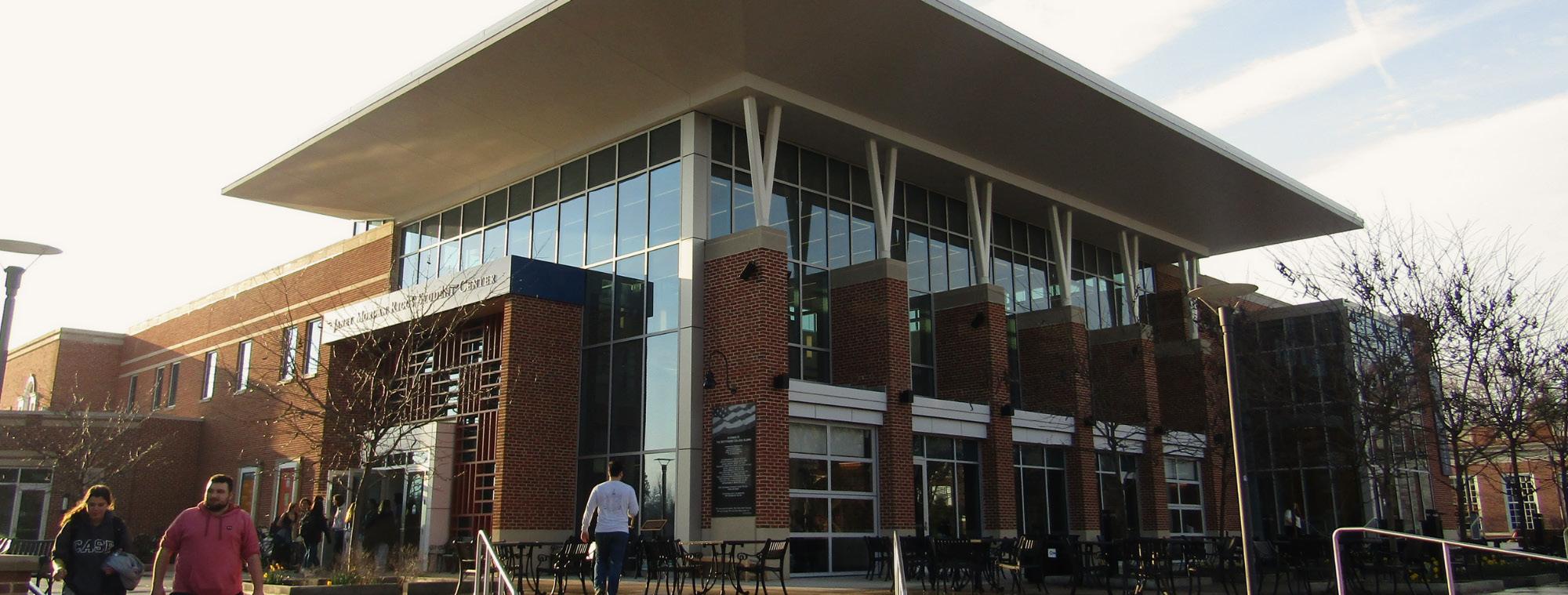
“[Gettysburg] police have certainly been helpful to the school for our safety, and they have a very rapid response, but the negative encounters with certain officers are terrible,” said Blake Dudley ’23. “There’s a reason why everyone knows one officer’s name in particular, it’s not because he’s a good cop
but rather the epitome of what people hold issues with policing in America. Dealing with college students and our antics must be frustrating, but they should not excuse the level of hostility that comes across in some cases.”
One officer, in particular, is most commonly mentioned by students, as they feel that he is overly aggressive in his meetings and tends to target college students.
Ben Sarnitsky ’26 commented on how this officer treated him and his friends differently due to their race and ethnicity.
“[He] came to my room and gave me a citation, but was very hostile toward my friends who are Asian and Hispanic. He did not ask me and my other friend (both white) any additional questions at all regarding the situation,” said Sarnitsky. Sarnitsky and this officer were involved in a second situation when Sarniksy called an ambulance for a friend. During the second meeting, Sarniksy found him once again, disturbing.
“ When the police arrived, the first thing [he] said was, ‘Hey, I remember you. Did you get your citation yet?’ I would usually find that remark funny or maybe just annoying, but because of my friend’s state, I found it deeply disturbing,” explained Sarnitsky. “[This officer] shows an extreme lack of empathy for all people and acts very hostile toward ethnic and racial minorities.”
An anonymous source had similar comments about this officer, saying “[He uses] aggressive behavior and language, only targeting me with questions when I was the only international person in the group. Showed lack of professionalism and good character, and everyone around noticed that.”
Ilana Subramanya ’24 also had a negative experience with a GPD officer when leaving a bar with her friends.
“ We were not stumbling or anything [when leaving], we had our arms linked together because it
was 10 degrees outside. A police car comes out of nowhere, and a police officer comes up, shines the flashlight in our faces, and starts aggressively questioning my friend who was in the middle of us,” she stated. “Once he realized we were not out of control drunk and we are not underaged he stormed back into his car, slammed the door, and drove off incredibly fast in a haste. He clearly was just looking for people to stop and hassle, and became extremely rude and unprofessional when he realized we were not doing anything wrong.”
When asked about the negative views students held for some officers, Police Chief Robert Glenny said, “I can’t really comment on that issue. I can say that we are aware of the perception of a couple of other officers and we watch that.”
Additionally, Glenny mentioned that there have been no formal complaints against any officers since Aug. 2022.
Looking at the relationship between the GPD and Gettysburg College’s students, Glenny felt that it is “generally good.”
“Relationships can always improve…And I think there’s sometimes some miscommunication between the entire campus community, so it could use some improvement. I don’t think it’s bad, [but] I would like to see it be more transparent both ways, within reason,” said Glenny.
Gettysburg Borough Mayor Rita Frealing, who has oversight of the GPD, had similar comments to Glenny.
“ I think since I’ve taken the office, the relationship is good, from what I see….But even with good relationships, there’s always room for improvement. And that’s why
I’m holding office hours on campus and I have an open door policy that the students can approach me because according to state law, I have oversight of the police department. So I want that relationship to be good,” said Frealing.
She also mentioned that she is working with Glenny to improve the relationship by “..listening and getting feedback and we’re getting involved in days like today [Coffee with Campus Safety] to come out and just have a good, solid relationship to make sure that the students know they’re part of the Gettysburg community and that public safety is at their call and we’re here to protect and serve and listen to their issues.”
Executive Director of Campus Safety Alex Wiltz discussed the GPD’s relationship specifically with Campus Safety, commenting “In general Campus Safety has a positive partnership with the Gettysburg Police. If there are concerns, Chief Glenny and I discuss them and come to a resolution.”
Student Patrol Officer and newly elected Senate Inclusion Officer Abby Ruggiero ’26 expanded upon the GDP-Campus Safety relationship.
She explained that Campus Safety interacts with the GPD out of necessity, stating “Campus Safety contacts the police only when we legally have to. In certain situations, for example, assaults of any kind, we have to contact the Gettysburg Police Department and they take over the situation. We try to involve them as little as possible but they have more power than Campus Safety since they are Law Enforcement.”
In terms of whether the relationship is beneficial or not, she said “I cannot really comment on whether or not their presence on campus is a good or bad thing [but] I have heard a lot of students complain about a specific
The GPD has been called to help the College with security issues in the past and has paid for those services. Wiltz stated “In September we had a request from numerous students for an added layer of protection from the police. GPD was hired to provide an officer to patrol the streets around campus for approximately 2 weeks. The total for this was just under $5,000.”
Some students are hopeful for the relationship with the GPD to turn positive in the coming semesters.
President-elect of the Student Senate and current Co-Chair of the College Life Advisory Committee (CLAC) Andrew Lemon ’24 said, “I am thrilled to see this relationship forming between Gettysburg College students and our local police department. This is a strong and positive connection to build. As CLAC committee chair, forging transparent and trustworthy relationships with other leaders of the community is one of my main objectives in improving Gettysburg College.”
Chair of the Wellness and Safety Committee Dominic DiLuzio ’26 expanded on Lemon’s views, adding, “The deteriorating relationship between police and the student body is due to inflamed emotions on both sides. The only path that I see forward is to come to a mutual agreement on how policing works on campus. Improving our relationship is the first step.”
DiLuzio and Lemon are working together to mend the relationship between Gettysburg students and the GPD by organizing an event to bring the two groups together. They, along with Chief Glenny, hope this event will strengthen the bond between the students and the GPD, for they are inevitably intertwined.
Overtime, Gettysburg College students have enjoyed traditions such as Twilight Hour, the First-Year Walk, International Food Festival, and Springfest. Now, many of these traditions have changed, and new traditions have taken their place.
Twilight Hour, a tradition that began in Jan. 2013, gathered firstyear students in the ballroom to walk to Pennsylvania Hall. Class officers then presented the president of the College with a scrapbook from their first semester and students learned the Alma Mater. This event occurred annually until 2019 when the College discontinued the tradition.
“ Twilight Hour was an attempt to create a new tradition for the college and it just never really stuck,” said Director of Student Activities and Greek Life Jon Allen. “We found…students weren’t really getting meaning out of it.”
Another event with changes was the First-Year Walk. In 2021, the class of 2024 participated in this tradition during their sophomore year due to the pandemic, which altered their experience.
“ Doing the first-year walk [as a sophomore] made me realize how much we missed out on during our first year,” said Maddy Filetti ’24 This tradition changed again in 2022 when the walk occurred along a new route following “a review of the use of cemeteries that are located in National Parks across the country,” according to Dean of Student Success Keira Kant.
With this change, the speeches after the walk no longer occurred
in the location where Lincoln gave the Gettysburg Address at the Gettysburg National Cemetery. Jack Young ’26 shared, “While the tradition is nice in theory, the actual implementation leaves much to be desired.”
Further, International Food Festival experienced modifications before becoming a component of Springfest.
Allen explained that the event was originally called Crabfest, “where dining bought a whole bunch of crab legs,” then students advocated to change the name to Oceanfest to provide alternative meal options.
In 2016, “there was an institutional push to think about how do we have more celebrations of internationalism in different cultures around campus…so we transitioned Oceanfest to International Foodfest,” explained Allen.
While International Food Festival originally occurred in the fall, the pandemic necessitated a change, so the event was held in spring 2021 In response to student feedback, International Food Festival permanently moved to the spring as a part of Springfest.
Allen explained that this move created a gap in the Springfest schedule because International Food Festival replaced several hours of programming. This allowed for the addition of 75 student-run activities last year, like Holi, Earth Day Fest, and the Black Student Union field day. Additionally, beginning in 2020, Springfest no longer included a hired performing artist.
“ The rationale behind this was that the types of performers students would want us to bring… would cost more than my annual programming budget,” said Allen. “The last Springfest concert that we did…we had to charge $20 per ticket and only 200 to 250 students showed up.”
Allen also discussed the emergence of new traditions like the SecondYear Halfway Hullabaloo.
Class of 2025 President Carl DeMarco ’25 explained that during this planned event, class officers will ring the Glatfelter bell “to ring in good fortune and success in the class’ remaining two years,” followed by a gathering with refreshments.
Despite attempts to improve traditions, students described a lack of tradition at Gettysburg.
“ From what I’ve heard from upperclassmen, we used to have more traditions and stronger connections within the student body,” said Rachelle Dale ’25 Alyssa Maslowski ’23 detailed her perspective as a senior.
“ I feel that the college has taken away or altered many special events that students look forward to throughout the year,” said Maslowski. “I would love to see traditions…make a return, or find a way to incorporate new traditions that bring together the entire campus community.”
Most Gettysburg students are familiar with the playful Bullet Hole worker and the sculpture made of tires located on the first floor of the library, but most do not know that the two are connected by the name Walner Edmond. Edmond, the son of Haitian immigrants, is a Gettysburg native. He has worked at Gettysburg College since 2000, starting with dishwashing part time in Servo. Around 2002, Edmond signed up for ceramics classes at Gettysburg. In 2005, he started working full time at Bullet. In 2006, Edmond officially became a part-time art student at the College. He was most familiar with the ceramic medium, but when a friend, Brian Lovett, passed away on Christmas Day of 2006, Edmond was inspired to try a new medium: tires.
Lovett was a Department of Public Safety officer for 24 years. In 2006, he acted as the Night Shift Supervisor at the Musselman Library Circulation Desk. Edmond had become friends with Lovett through their shared experience of working for the College. Lovett taught Edmond about the highway cleaning he participated in and the plethora of tire scraps that coat the shoulders of highways such as the nearby Route 15. On New Year’s Day of 2007, Edmond began collecting tires from the highway to utilize in the sculpture he would later dedicate to Lovett: “Head Lock.”
“ Head Lock” was officially donated to Musselman Library on May 20, 2008. It is a sculpture of an armless man, made of tire scraps, tethered
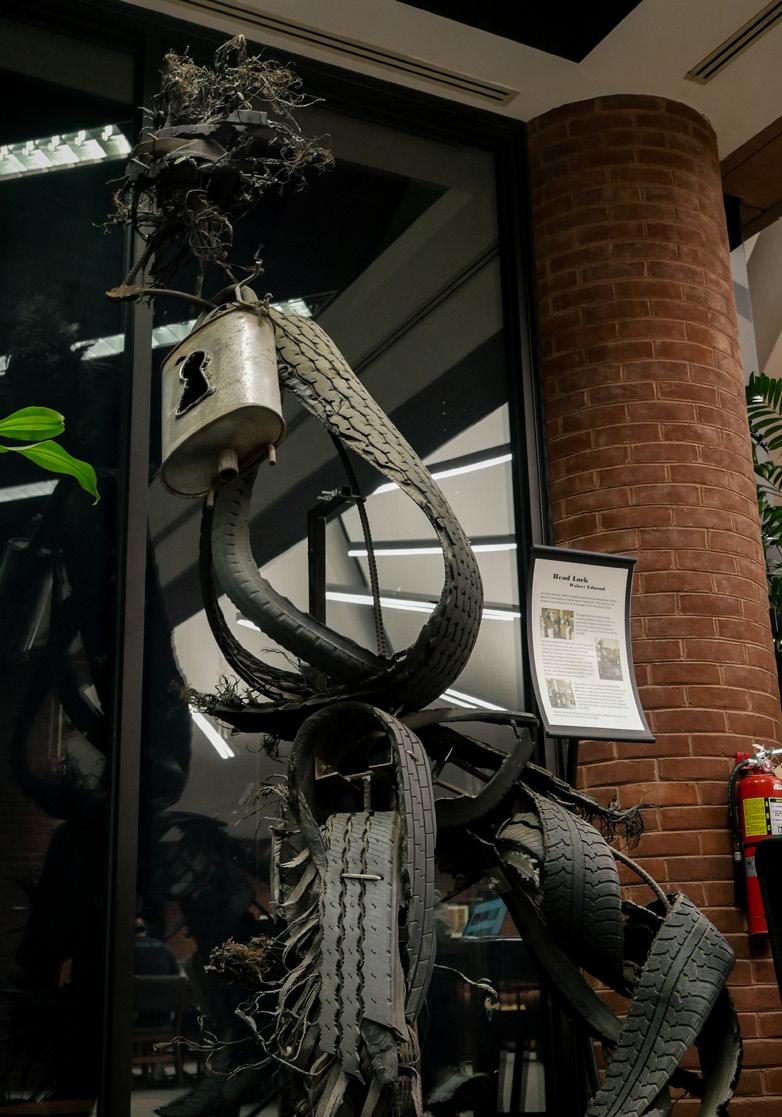
by a massive lock around his neck. This lock was formed from a muffler. Edmond described the message of his work, “There are some things about yourself that you can’t change, and that’s what makes you you. So it’s kind of like baggage, but baggage you don’t want to necessarily change.” The lock also has no key, which Edmond understands as “accepting and moving forward” with this baggage.
Following Edmond’s presentation of “Head Lock,” which won the first place prize at the 2008 Student Juried Exhibit, he received his bachelor’s degree in fine arts at Alfred University. He credits Gettysburg professors Mark Warwick and Tina Gebhart with encouraging him to attend art school. During his senior year of college, Edmond’s work became part of a permanent fixture in Austria. Following his graduation, Edmond returned to Gettysburg College to
TA for art classes. Edmond was commissioned for 32 two foot tall abstract wooden sculptures in 2012. This work is currently in Hawaii. Edmond received this opportunity from an art dealer he met through Professor Warwick. Edmond has grown to appreciate found materials as an artform. He likes that each piece has its own history and that he can provide a second life for them. The most important part of this type of work is “finding the beauty in things [that are] overlooked," according to Edmond. In fact, he discovered that his brother who recently passed, Rodney, was inspired by him to clean up around Gettysburg with his daughter. Rodney never used the objects for art, but he too was artistic. Actually, the entire Edmond family is artistic in some way, as Walner’s sister, Noline, is a ballet instructor.
As of right now, Edmond’s current art project is his children. As a father of two daughters, he has significantly less time to dedicate to art, but he and his wife, Heather ’09, have been very active in the Gettysburg and College communities, even helping to build the greenhouse at the Painted Turtle Farm.
When asked what advice he has for current students interested in art, Walvner Edmond advised, “Just make. Share your ideas. People won’t know [your ideas] until you share them.”
"If I thought four years ago, I would be graduating with two majors, and one minor, researching Black women’s representation in music awards, and performing a senior recital, I would have laughed. So, to sit and reflect on all my accomplishments creates a feeling of immense pride. Although, my college years have had difficulties, such as dealing with the college’s inequities or studying through a pandemic; I have grown and accomplished so much at Gettysburg. Majoring in Music and Africana Studies allowed me to foster a love for Black music and Black feminism. Through this major, I was able to be a student of the brilliant Dr. Williams and learn about social justice theory, not only within the classroom but within everyday life. With the knowledge and self-love gained through these classes taken, I know I am walking away from Gettysburg a strong woman of color and a leader in the world."
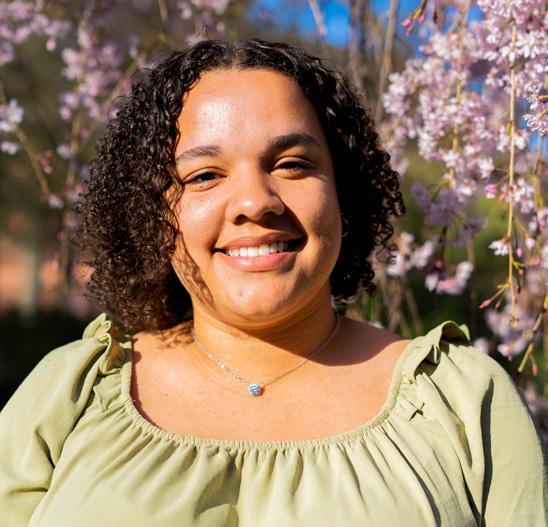
"My time at Gettysburg has been filled with many highs and lows, but I would say it has been a time of growth and self-discovery. Though I spent three years of my career here pursuing the wrong major, I discovered more about myself in those three years than I had in my entire life. One of my biggest regrets will always be not quitting my major earlier on and allowing myself to discover areas that I was actually passionate about, but once I found my way out, I was able to grow into the person I am today. I often feel that much of my time has been wasted, but when I look at the world I have created around myself I think I have created a life that I am really proud of. For that, I am Gettysburg grateful."
"I have had a great overall experience at Gettysburg College. The moment I declared my English degree in my Junior year, I felt like a part of the department and have found all of my courses to be interesting and suited to my style of working independently and keeping up with my reading—it also helps have such supportive faculty who are always willing to help with coursework or anything else. There are times I feel sick of my routine, but I found my experience with studying abroad in Greece last semester to be the perfect break from regular schooling, and I made friends outside of Gettysburg in my program that I will have forever. Even though the goal was to take a trip away from Gettysburg, it was the Center for Global Education that made the process of applying, going, knowing and paying so easy in the first place. These are just a few reasons why Gettysburg will always hold a special place in my heart."
"I transferred to Gettysburg after my freshman year at a different institution. I was genuinely happy and enjoying my college experience for the first time after what had been an incredibly hard year. I started at Gettysburg in the fall of 2019, meaning that Covid hit in the spring of my second semester on campus, and lockdown restrictions were in place for the next year. I am deeply saddened when I think about what could have been if I had had a «normal» Gettysburg experience, but Covid (as horrible and deadly as it was and continues to be) was also a blessing in disguise for me. During the lockdown, I made the decision that I loved my time at Gettysburg so much that I wanted to take an extra year, meaning I would spend four full years here, instead of the three it would have taken to finish my degree. If it hadn›t been for Covid, I don›t think that I would have decided to do that, and I am so glad that I did. I have loved every second of my time at Gettysburg and I know that transferring here was the best decision I could have made."
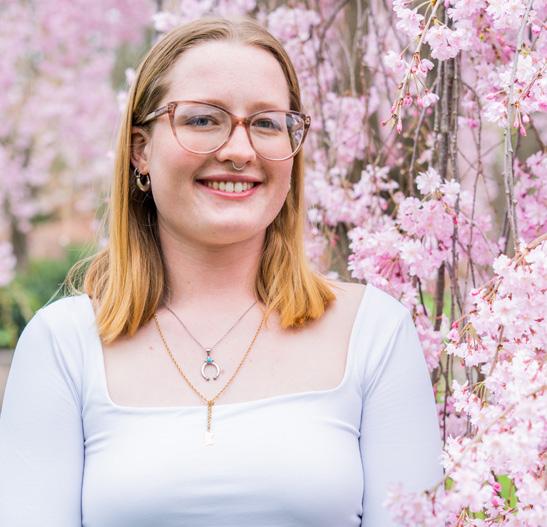
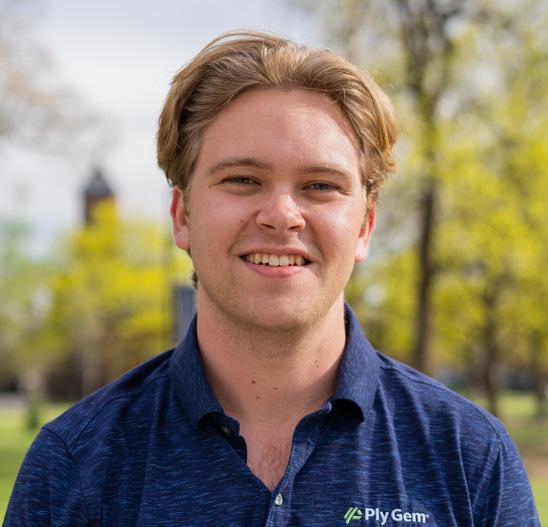
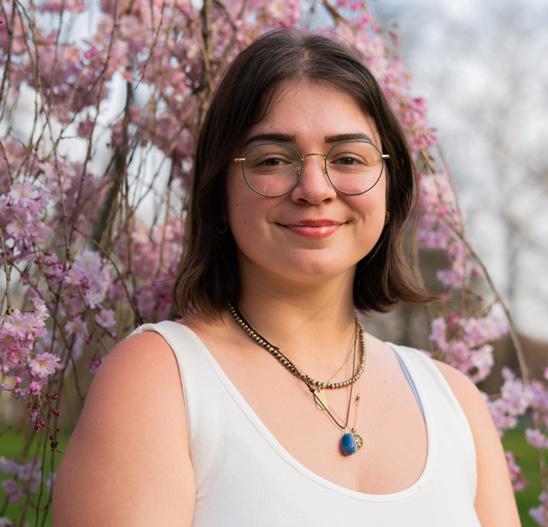
"Flying six hours to find the college that would be my home for the next four years was not exciting at all. It was not all rainbows at the beginning. The cultural shock was very intense for an 18-year-old girl from Texas and there was no one to support me and understand how confused I was feeling. Being a Hispanic in a white-dominated school made me question my identity and capacity inside and outside the classroom. Then a pandemic took over my college experience and made me spend my sophomore year back home. However, all the anxiety from moving across the country was worth it when I reached the place that was constantly giving me friendships and memories. There was a huge change in my perspective and how I changed stereotypes by being the first in many things. The first to go to college out of state and the first to join a sorority, all while not being from the same ethnicity or race as my peers. Joining a sorority made me love Gettysburg more than my hometown by giving me a group of girls that believed in me and celebrated my own achievements. As a senior about to graduate with a double major in Psychology and Spanish and a minor in Education, each course has definitely challenged me to bring my cultural background into perspective. My experience at Gettysburg College has been so rewarding and it is definitely going to be my hardest goodbye."
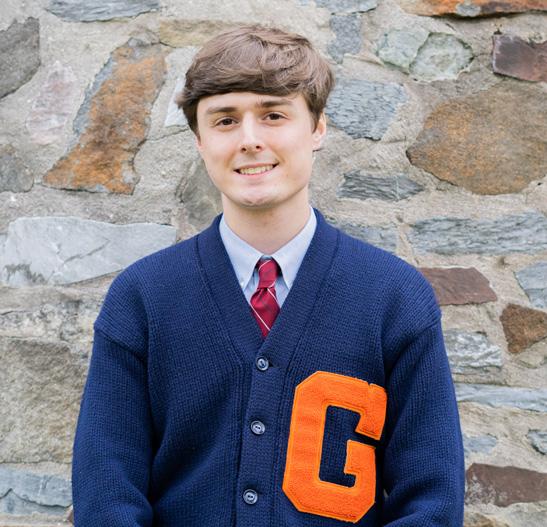
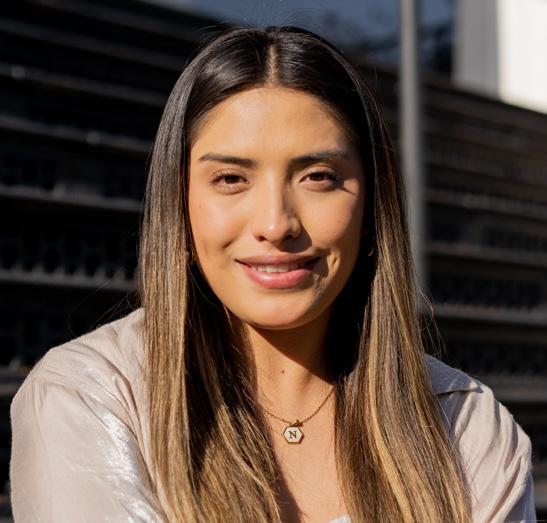
" When I look at my hands today, I don’t see them the same way as I did when I arrived in Gettysburg during my freshman year. Like everything about college back then, my hands seemed so new. I could never imagine just what I would apply them to. Week after week of classes, these hands gripped a pen as I worked frantically to record as much as I could from my professor’s lectures. I spent many late nights hammering away the keys on my keyboard, working tirelessly on paper after paper. They carefully flipped the pages of so many books, spanning a variety of subjects I never thought I’d investigate. I brought these hands with me on summer internships, where I put them to work recovering historic artifacts from the Earth. I’ll always remember those feelings of holding something left behind so long ago, such a tangible connection to a time so distant from today. But just as it hasn’t all been bad, it hasn’t always been good either. As the years have passed, these hands have been scarred over and over. There were days when they held my face when I wanted to do nothing more than give up. There were times when all I could do was reach out, hoping someone would take them.
And my hands were always met by those I needed the most. When my hands were hurt, they always healed. When I wanted to throw in the towel, they wiped my eyes and I found the strength to push on. They’ve shaken other hands as I have made connections I will value for the rest of my life. They’ve been loved too, held by those who touched me so deeply. Come May, I will use these hands to gratefully accept the diploma I have worked so hard for these past four years. No matter how difficult things were, I always knew this place was special. I was never one to merely sit and absorb facts and knowledge, but one who always valued working with his hands. Gettysburg College gave me a chance to use these hands to do great work. When asked to write about my Gettysburg experience, I don’t think I could really put it all into words. Instead, I wear it proudly on my hands."
This past fall, Campus Safety Officer Ricky Pearce retired after eleven years at Gettysburg College. Pearce was known for connecting with students on a personal basis.
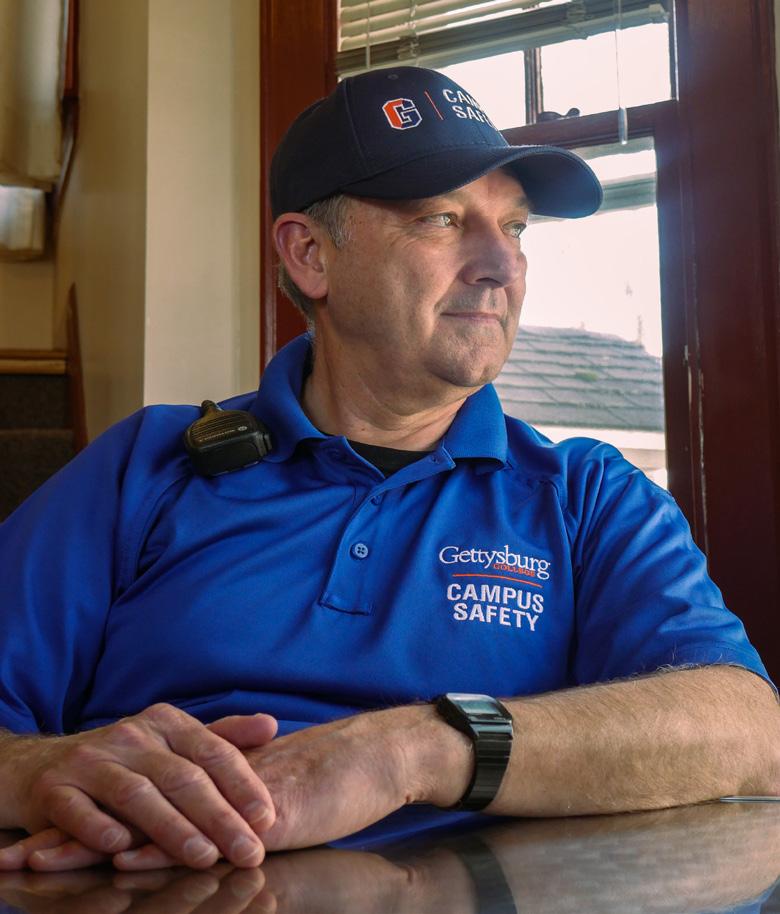
Before coming to Gettysburg, Pearce worked for the National Park Service at Gettysburg. When he saw an opening at the college campus in 2012, he decided to apply.
Pearce listed his first year working at the college as one of his fondest memories at Gettysburg. His first assignment was Paul Hall. He said that the residents were “welcoming and supportive, and the RC and RAs helped assist me in my transition with what my duties were. It put me on a good path for how I would do my job for the rest of the time I was here.”
Throughout his time at Gettysburg, Pearce also worked as a field training officer to prepare new officers for their job. As part of this assignment, he worked through scenario training with officers and credited students with making these scenarios more realistic. Their stellar acting and feedback contributed a great deal to new officer training.
When speaking about his personal work philosophy, Pearce continually emphasized the role that students play on campus and in his life.
“ Students making it possible and making the difference, that’s the reason this place is great,” he said.
Pearce always encouraged students to let him know if he was ever not doing his best work, as, according to his work philosophy, he always wanted to give his best.
When asked about Pearce’s retirement and legacy, Assistant Director of Campus Safety Faith
Biesecker commented on his “unparalleled ability to remember student names and bits of information about them.”
She also relayed a story about his work ethic and activities.
“Officer Pearce used to do an activity with his liaison groups where he asked a volunteer to squeeze as much toothpaste as possible out of a brand new tube of toothpaste. He would then ask the volunteer to put it all back in, which of course was impossible,” Biesecker said. “He used the activity as a reminder for students to be kind and to think twice about what they say to one another. Words have an impact on those around us and that is a life lesson we all need to learn.”
Post-retirement, Pearce is planning a trip with his wife, with whom he will be celebrating his fortieth anniversary in May. The couple will be visiting places such as Acadia National Park, Nova Scotia and Prince Edward Island.
Many students at the school recalled Pearce’s ability to remember names and small details
about the student body. Ronald Moyer ’23 told a story about Pearce.
“ I went to his retirement party. We had asked him about his favorite memories and he brought up a memory of me and a lucky charm cereal bar that I offered him freshman year, and he still remembered me giving him that cereal bar and that was a special memory for him. He would always bring up that story,” said Moyer.
Moyer also noted that despite the distance created by COVID-19, Pearce always remembered him. Cam Jury ’23 shared similar thoughts on Pearce’s ability to connect with students.
“Officer Pearce has been a welcoming addition to the Gettysburg community for all of his many years on campus,” Jury said. “Whether it’s going out of his way to personally introduce himself and get to know every one of his residents’ names, giving out candy to students during finals, or just always being a friendly face, he has brought so much endless joy to the students.”
Jury expressed that Pearce’s presence will be missed on campus.
“ Pearce is clearly passionate about what he does, and I have never once heard anything but outstanding praise for him by all students. He will be missed on campus but should know he has a home with us always,” Jury said.
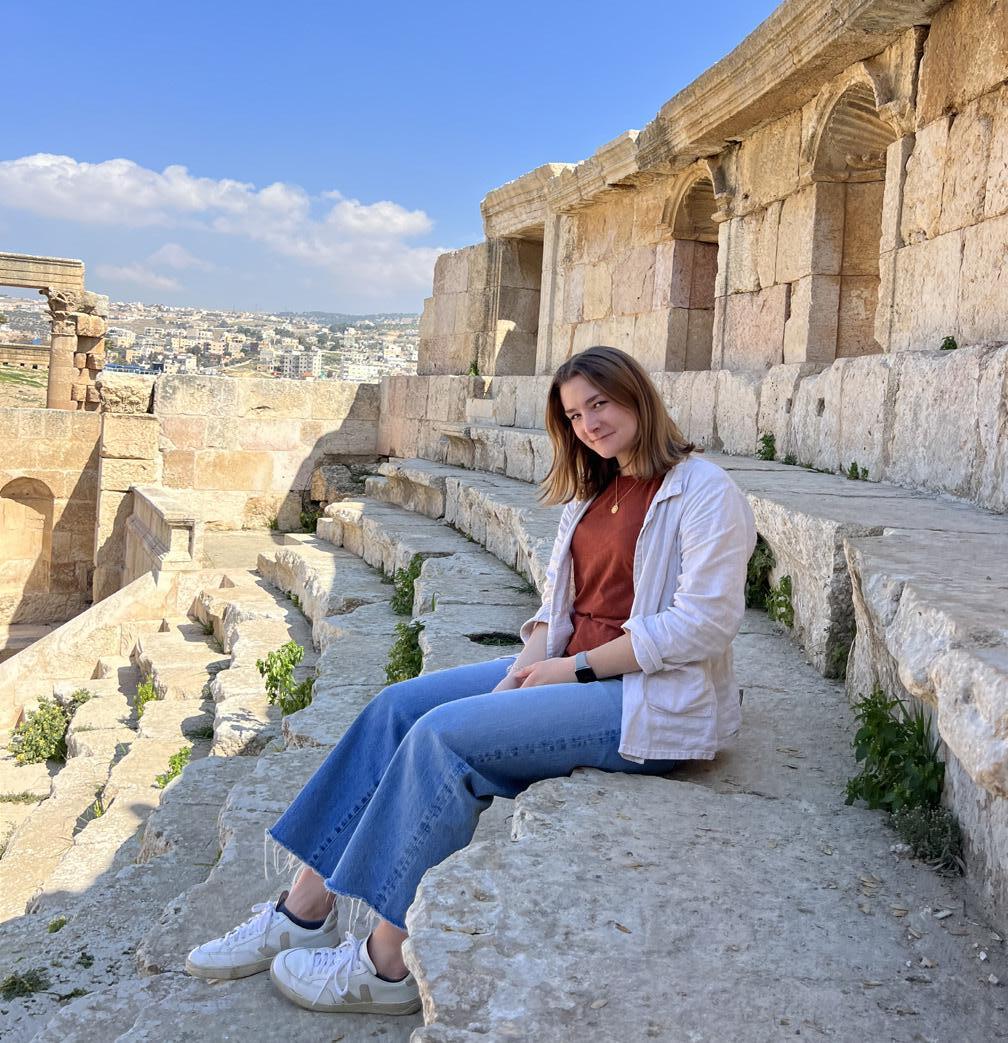 By Natalie Peck, Contributing Writer
By Natalie Peck, Contributing Writer
Welcometo Jordan!” This phrase has been repeated to me at least once a week over the last two months since moving to Amman, Jordan and I know I’ll hear it until I leave. Sometimes, it’s spoken in an Uber on my drive back to my homestay while I’m clutching the headrest due to the wild driving that makes New York drivers seem tame. Sometimes, it’s in my host family’s living room as I meet another new extended family member. Every time, without failure, it’s delivered with a giant smile.
At the beginning of the program, I walked out of orientation thinking to myself, “what did I get myself into…” I definitely experienced culture shock, and combined with the cold weather of Amman’s winter, it created a sense of uncertainty. However, Jordanians are known for their generosity, and soon enough, I felt at ease. The anxiety about living with a host family for three and half months was relieved when I was welcomed into the arms of a family that has done nothing but treat me as if I was a direct extension of their family, a child, and a sister.
I’m still getting used to my local friends constantly insisting to pay for my coffee, Henna tattoos, or for adventures we are always getting into impulsively on random nights after “Iftar.” One night, a few students and I were drinking tea at a cafe and walked up to a group that looked our age. Now, having become good friends, they allow us to ask questions about the intricacies of their lives and culture.
The concept of independence is different here. Typically, I would be confident to hop on any bus in a European city because I’ve been able to communicate enough in those languages to get by. Here, I know very little Arabic and rely heavily on my local friends to translate and handle any possible challenges, which I am not used to, but that’s the fun in it! You’d be surprised at how many Jordanians speak English, better than my Arabic half of the time!
The beauty here is also unique. Gone is the lush greenery that I see in my hometown, or Gettysburg for that matter, and in comes the incredibly beautiful desert colors. Every time I experience a new region of Jordan, whether it’s the Dead Sea, Ajloun Forest, or Wadi Rum, I’m met with a new sensation that fully intoxicates my brain. A month ago, I was sitting with my cohort on top of a rocky hill with a lone, scraggly tree on top. We had just hiked up, and chose various patches of rock or grass to silently perch on. We watched the sunset, while looking towards Palestine/Israel, and listened to the “Adhan,” the call to prayer. The palette of colors and sounds set me so at peace that it will forever be ingrained in my brain.
I will admit, the culture is unique with a different value system, but my major prepared me for this and how to integrate. While every day here, I learn, see, or do something new, there are still elements that I miss like going for a drive with friends, or not having to pay for water at every restaurant or cafe. But being in this water-poor country, I no longer take for granted how lucky we are in the U.S. for the abundance of water.
In two month’s time, I’ll be sitting on a plane heading back to the East Coast. I’ll be having zait and zaatar “olive oil and spices” withdrawals, missing my host family’s killer tea that I had every single day, and missing some of my best friends. My henna tattoo of the outline of Jordan may have faded, but the memories I’ve made here never will and inshallah, or “God willing,” I will return again!
Faculty meetings are exclusive events that construct the future of Gettysburg College but lack important members of campus: the students. Persisting issues and new concerns are showcased during these meetings that directly and indirectly impact student futures, but we are not welcome to join the conversation.
The Curriculum Review Committee (CRC) is working to create a new curriculum that will begin with students in the class of 2028. Faculty members argue back and forth, amending and reamending the curriculum based on their understanding of current students. Anecdotes about conversations with students are not enough. Student voices must be heard and included.
Alumni have also been given a chance to voice their opinions of the curriculum-making process. While this is a student perspective, it is not a current student perspective. Campuses change and current students represent those changes. It is irresponsible of the administration to not acknowledge the changing state of campuses, especially revolving around the pandemic. Academia looks different than it did twenty years ago. It looks different than it did five years ago. The world has changed through the integration of online learning and student objectives, and the new curriculum needs to represent that.
One proposed idea by the CRC includes half-credit sophomore and senior seminars. The inclusion
of half-credit seminars echoes the professor’s pet projects of the first-year seminars (though those classes were still given for full credit). While the seminar may be intriguing and thought-provoking, perfect for a liberal arts education, it is not attainable. Sophomores and seniors do not have the time in their schedules to fit in a seminar that is not even worth a full credit. Students, especially seniors, are busy planning their futures and there is simply not enough time to take a class that does not contribute to their majors.
The administration attempts to support marginalized students through research on how those groups may interact with courses but fails to include those students in conversation. Scholarly research about underrepresented student opinions does not take the place of active student voices. If a decision is being made that affects marginalized groups, those students should be a part of it. The administration is actively silencing marginalized students by not allowing their perspectives to be shared in the process of making a curriculum that affects the future of their education.
The solution? Allow current students to have a say in the making of the new curriculum. As it is logistically impossible to have complete student inclusion in meetings, the administration should seriously consider including current student opinion in other aspects. Focus groups and discussion outside meetings would
initiate students directly into the curriculum curation without nearly as much division. As professors are currently using anecdotal examples of student perspectives, the curriculum is not representing the majority of campus. Including students in the process would create a well-rounded team of what students are interested in and what the current curriculum can benefit from. This is not to say that professors are left out of the conversation completely. It is the balanced voices of students and faculty that will create the best curriculum.
These curriculum issues do not just impact us. The future students’ education at the College will be incredibly impacted by these faculty members’ incomplete decisions. While the world inside and outside of academia will continue to change after graduation, current students are still the closest group to these incoming students’ perspectives and will have the most beneficial outcomes.
Upperclassmen may be quick to cast aside these complaints because it does not immediately impact their academic career at Gettysburg, but these changes go far beyond our four years on campus. The College’s reputation follows graduates in every job interview and graduate school application. Even if we will not be around to see the integration of the new curriculum, the state of the college as an academic institution will continue to impact our lives after graduation.
Students are inadvertently being hurt through the hiring process of new high-ranking positions in the administration. Dr. Jamila Bookwala, the new provost, is creating two, high-paying positions between her and the existing upper-level provost roles. The disconnect between the administration and students grows and the consequences will impact the entire College. The increase in these higher-ranked positions continues to lengthen the distance between the provost, the faculty and the students. The disconnect is undeniable. The sheer amount of these positions functions as a barrier between these groups and endangers the future of effective communication for the College, which is already strenuous. Not all of the administration’s attempts to create a better academic experience for future students have been poorly planned and executed. In the name of “consequential education,” the College is developing the Guided Pathways scheduled to begin in fall 2023. The program will focus on the importance of mentorship
and career aspirations. The plan is a non-compulsory opportunity for students to have a faculty advisor, co-curricular advisor and career advisor with access to competitive grants. These plans, while not seen in practice, are admirable and prove the College has the capability of actively aiding students in effective ways.
However, the College hiring two more high-paying administration positions causes concern for professor retention. While new administrative members join the college, the existing faculty are receiving less pay on average than faculty at peer institutions, according to a report in the fall from the Faculty Finance Committee. The lack of pay increase for faculty members will impact professor retention and student education. If faculty do not receive their proper pay, there will be less motivation for them to stay at the College. Students carry the reputation of Gettysburg College with them through their academic and professional careers and the blatant disregard for faculty is concerning.
The easiest solution to these issues of professor retention is for the College to confront its treatment of faculty. There has been a consistent problem of faculty and staff of color leaving the College. The College needs to listen to the critiques of its faculty to ensure the future of Gettysburg academia. The majority of students are unaware of these multiplying barriers unless they hear about it from their professors directly. Why does the College continue to hinder students' roles in these decisions? The student population is at risk of harmful consequences as a result of these arrangements while they are still unable to be a part of the conversation. It is critical that students be allowed to be a part of the conversations that directly and indirectly impact their future at and beyond their four years on campus. Student perspectives need to be taken more seriously; the future of Gettysburg depends on it.
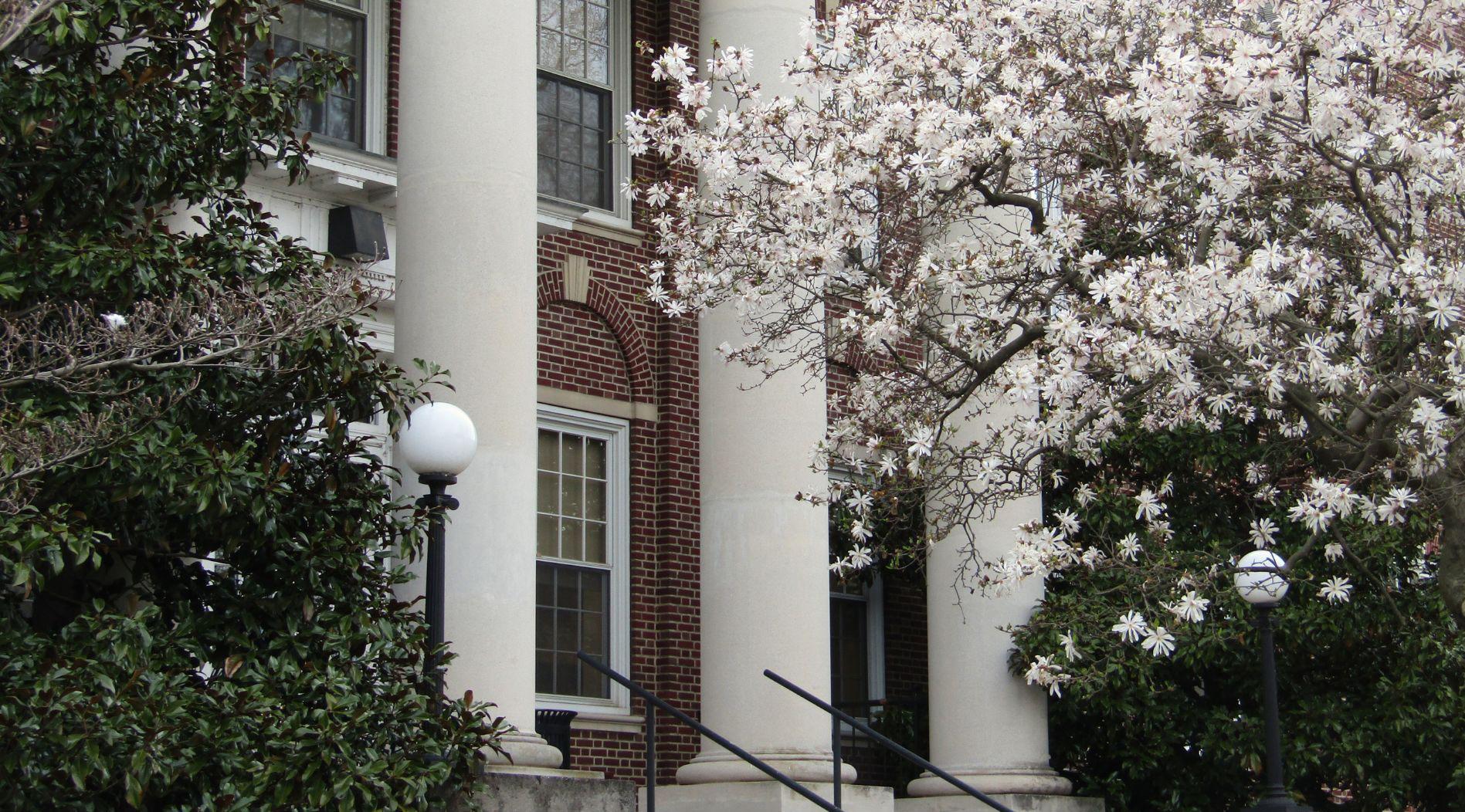
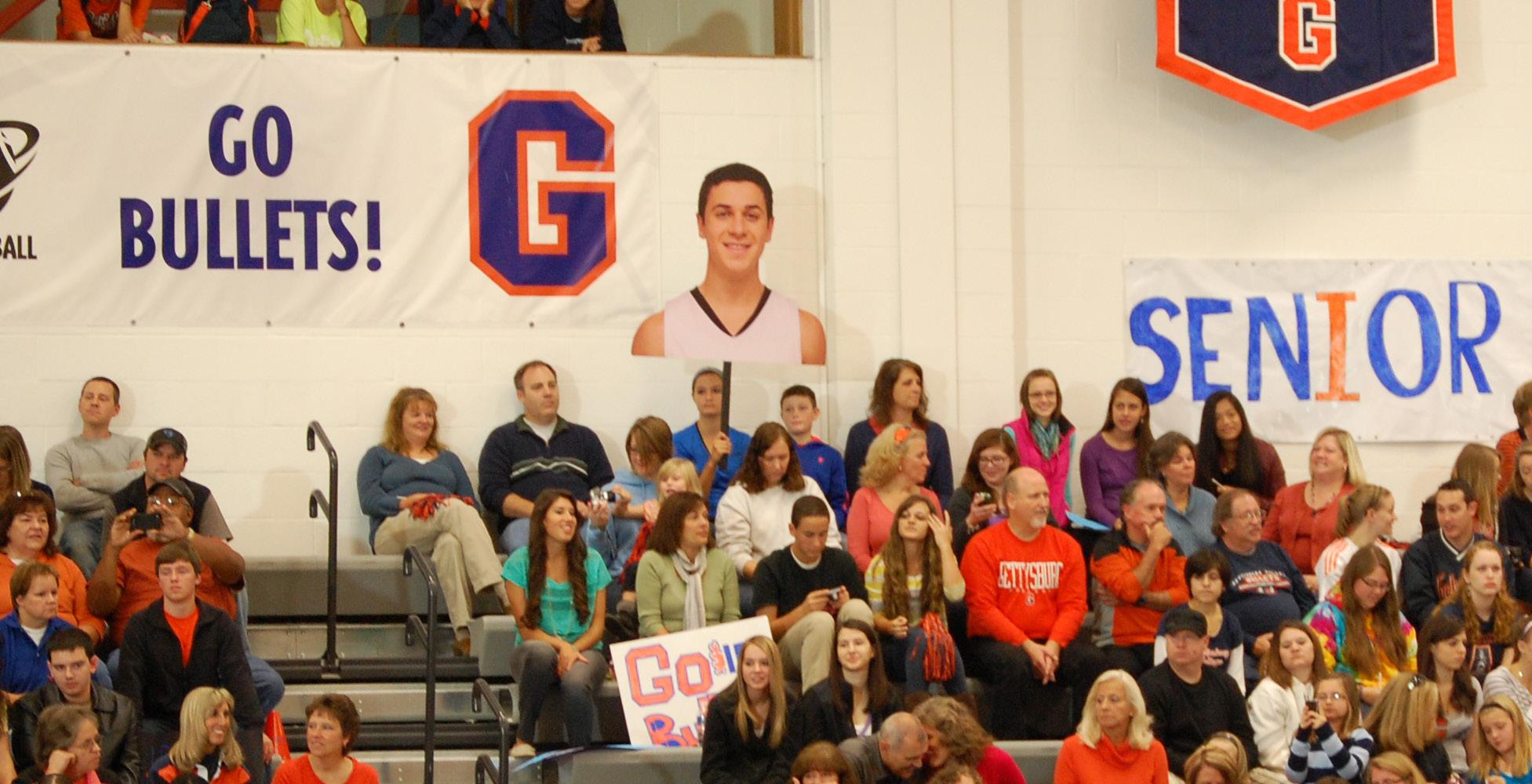 By Jack Herr, Sports Editor
By Jack Herr, Sports Editor
the likes of ESPN, Yahoo Sports, NPR, and Hollywood. The College and Weissman received multiple offers from producers, but they went with Bruce Gordon and Bob Burris’s vision. Actor David Henrie was to play Weissman himself. Before filming, Weissman actually flew out to California to meet with Henrie, who wanted to get to know the man he was playing and do a “character study.” By the time production started on campus, the two were close and “texting each other back and forth.”
Showcasingone of the more inspiring stories to come out of Gettysburg outside of the Civil War battle itself, “1000 to 1: The Cory Weissman Story” represents Gettysburg athletics at its best. As Cory Weissman ’12 put it, the film’s timeless message of “overcoming adversity, never giving up, and keeping a positive attitude” is one that has resonated with audiences across the country. It all started on March 26, 2009, when an arteriovenous malformation in Weissman’s brain erupted, causing a stroke that sent him to the hospital for 11 days. As depicted in the film, Weissman was in the Jaeger Center lifting weights with teammates when the left side of his body suddenly went paralyzed. Weissman credited the athletic training staff, who were the first responders, for “potentially saving [his] life.”
“ We went to the athletic training room, and because of their quick actions of assessing how it was and what was going on with my health, they realized that it was an absolute emergency and crucial to getting into the
hospital,” explained Weissman. Since graduating as a health sciences major, he himself worked in athletic training before switching over to medical device sales.
The rehabilitation process was a long road, and those same athletic trainers were there every step of the way for Weissman. “These are people who really were helping me with my exercises but also asking me how I felt and how I was emotionally,” he said. While he regretted not being able to spotlight them more in the film, he applauded the producers for their accurate portrayal of how timely the training staff responded to his emergency. After years of rehab, Weissman had a chance to once again play the game he loves. On Feb. 11, 2012, in a conference game vs. Washington College, Weissman subbed in with under a minute left and was fouled. At the free throw line, he sunk his second of two, prompting a blissful roar from the crowd. While the 1000 points he scored in high school were special, this one point will always mean the most to Weissman. The story immediately attracted local and national attention from
Weissman relished being a part of the filmmaking process. “It felt like a family,” he said. “So I›m trying to graduate. I had three classes that I was trying to complete. And they’re filming a movie about my life and reenacting scenes from my life. So it was an interesting experience. But it was awesome.” Most scenes were filmed on location, creating an exciting “buzz” around the small campus. Weissman was careful to spoil anything about the movie, but he encouraged today’s students to watch the film (which is free on YouTube) and keep his inspiring story “relevant.” Not only did the filmmaking process bring the whole Gettysburg community together, but the film emphasizes the intimacy of the Gettysburg College experience.
“Everyone was there for me just to kind of pull me along, pick me up and help me out. And again, whether it was the staff, whether it was my professors, my coaches, teammates, whoever it was, everyone was there. Everyone was there to help me and I think the movie does a good job portraying that.”
Made by Ella Prieto Across
1 -Instagram friend
8 - Baby cat
13 - Keeps you cool
14 - Suffix for an expert in an aca- demic branch of learning
17 - Aussie friend
18 - “ Midnights” singer
20 - Gettysburg department that focuses on climate change (abbr.)
21 - Oval shape
22 - When the game ends in a tie (abbr.)
23 - The rarest blood type
24 - A long educational speech
28 - Not potential energy (science abbr.)
29 - Federal government›s emer- gency agency (abbr.)
31 - "It's okay, this stuff _______"
32 - Used on farms
34 - "____ Big Fat Greek Wedding"
35 - Surrounded by
38 - Gettysburg department with Monani, Principato, and Ogra (abbr.)
39 - How the Easter Bunny gets around
40 - Obama’s Dreamer policy
41 - Either a motorhome or trailer
42 - "_______ with my little eye...."
43 - Place to put drinks on a sofa
- But that’s…
63 - Gym class Down
1 - Syllable in the major scale following MI
2 - Drake’s brand
3 - Sister Jean’s college
4 - Skateboarding trick
5 - Step to build a fire
6 - Popular plumbing valve
7 - Take the challenge
9 - …to cry (song)
10 - __-da
11 - Korean rice cake
12 - Ayer, hier, ieri
15 - Opposite of Northeast (abbr.)
16 - Major scale syllable following LA
19 - Club that Mike Wheeler was in for Middle School
23 - Following
25 - Oscar nominated psychological thriller starring Cate Blanchett
26 - How fast an engine is going
27 - Gloomy Whiney the Poo character
30 - State where gerrymandering first occurred (abbr.)
33 - Throw
36 - The ants go…
37 - Flew too close to the sun
43 - Physical illness
49 - Purple flower named after the Greek word ‹star›
50 - Taste and enjoy
53 - Spanish verb ending
59 - Hurts to stub
61 - Person who started a Twitter thread (abbr.)
You can find the answers to the crossword onlineatgettysburgian.com

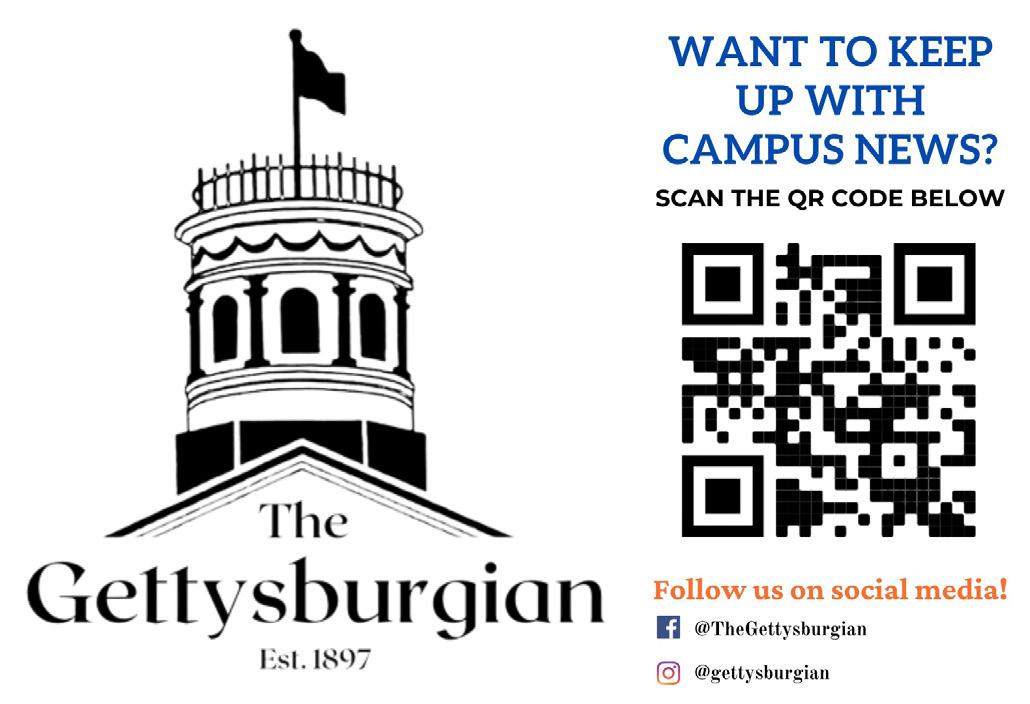
Katie Oglesby, Editor-in-Chief
Alli Dayton, Managing Editor
George Malian, Magazine Editor
Laken Franchetti, News Editor
Ella Prieto, Assistant News Editor
Kyle Hammerness, Features Editor
Victoria Staub, A&E Editor
Mikelyn Britt, Opinions Editor
Jack Herr, Sports Editor
Vincent DiFonzo, Content Manager
Anna Audia, Lead Copy Editor
Lauren Chu, Social Media Manager
Eric Lippe, Director of Photography
Dr. Scott Boddery, AdvisorCoverPhotobyEricLippe/TheGettysburgian
StaffPhotobyWillOehler/TheGettysburgian
